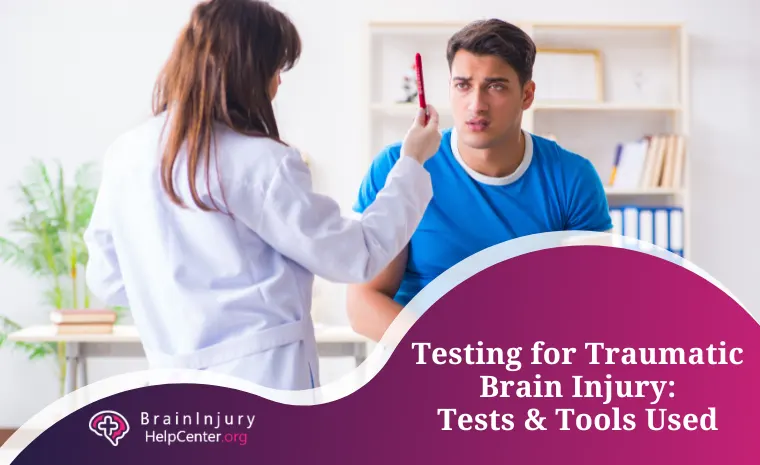Getting in an accident can unfortunately result in a traumatic brain injury (TBI) and it is important to have a proper diagnosis as soon as possible. In order to diagnose a TBI, testing is often done using both physical and psychological tests.
In this article, we will talk about the tests and tools used to diagnose traumatic brain injury (TBI) and the reasons why they are important.
TBI From Car Accidents
Reckless driving is a dangerous behavior that increases the risk of accidents on the road. It involves disregarding traffic laws and driving in a manner that endangers other drivers, passengers, and pedestrians. Some common examples of reckless driving include speeding, running red lights or stop signs, tailgating, weaving in and out of lanes, and racing or attempting stunts.
A TBI is often the result of a car accident caused by reckless driving. It is important to have an accurate diagnosis to provide proper treatment and maximize the chances of a full recovery.
A TBI occurs when the brain is jolted, bumped, or poked by an external force, causing the delicate network of nerves and neurons to become disrupted. It can happen to anybody, though data suggests that some groups are at greater risk of getting it or having worse health outcomes after the injury. These include children and teens under the age of 20, males over the age of 65, and those who have been in a motor vehicle accident.
One of the most challenging aspects of TBI is that it can be difficult to predict exactly how it will affect a person. Some TBI victims may experience a full recovery, while others may struggle with the aftermath for the rest of their lives. For this reason, it is important to consult a medical professional and begin testing right away.
Do you suspect a TBI after a vehicular accident?
Call the Brain Injury Help Center for a free consultation.

Testing for Traumatic Brain Injury
There are certain tests to determine whether or not an individual has a TBI. Testing for traumatic brain injury can include:
Computerized tomography (CT) scan
A CT scan is first performed in an emergency room for a suspected traumatic brain injury, where it uses a series of X-rays to create a detailed view of the brain. Through this procedure, fractures and bleeding in the brain or hemorrhage, blood clots or hematomas, bruised brain tissue or contusions, and brain tissue swelling are easily seen.
Magnetic resonance imaging (MRI)
If the symptoms of a brain injury are not improving, an individual can receive an MRI to obtain a comprehensive image. This procedure utilizes magnets and intense radio waves that help medical professionals get precise results.
Intracranial pressure monitor
To monitor the tissue swelling and subsequent pressure, which can cause further harm to the brain in a TBI case, medical professionals may insert a probe through the skull. In order to ensure patient safety, it is important for doctors and healthcare providers to keep track of this insidious hazard.
Traumatic Brain Injury Questions
There are traumatic brain injury questions that we can use apart from the TBI tests. These are typically asked by a doctor to assess the patient’s mental and cognitive abilities following an injury.
The questions cover topics like memory, attention, language, problem-solving, and other executive functions. The answers to these questions can provide the doctor with valuable information about the patient’s condition. These include:
- How did the injury occur?
- Did the person lose consciousness?
- How long was the person unconscious?
- Did you observe any other changes in alertness, speaking, coordination, or other signs of injury?
- Where was the head or other parts of the body struck?
- Can you provide any information about the force of the injury? For example, what hit the person’s head, how far did he or she fall, or was the person thrown from a vehicle?
- Was the person’s body whipped around or severely jarred?
Such questions can help doctors determine whether a person has suffered from a traumatic brain injury and what treatment is necessary. It is essential that medical professionals accurately diagnose the condition in order to provide proper treatment and maximize the chances of a full recovery.
Importance of TBI Tests
Testing is critical to determining the extent of damage caused by a TBI, as well as what type of treatment is necessary. It’s also important to note that TBI tests don’t just gauge the effects of a single incident, but rather can track any lasting damages over time.
Early detection
TBI testing can help detect the presence and severity of a TBI as soon as possible after an injury. Early detection allows for prompt treatment and can improve outcomes for the person with the injury.
Assessment of symptoms
TBI testing can help determine the specific symptoms and impairments a person is experiencing as a result of their injury. This information can guide treatment and rehabilitation.
Monitoring progress
TBI testing can be used to track a person’s progress over time and determine the effectiveness of their treatment and rehabilitation.
Legal documentation
In some cases, TBI testing can provide legal documentation of a person’s injury and its impact on their life. These documents include medical records, insurance information, witness statements, and related evidence.
Proving TBI In A Personal Injury Claim
When a personal injury claim includes Traumatic Brain Injury (TBI), it is usually deemed to be serious and can result in substantial compensation for the victim. These damages might include reimbursement of medical costs, rehabilitation fees, lost income, as well as reparations for pain or emotional distress suffered during this traumatic event.
The value of a Traumatic Brain Injury (TBI) claim is calculated based on several aspects, such as the injury’s severity and duration, the victim’s pre-incident income levels and employment opportunities, as well as its daily lifestyle implications. In certain cases where permanent impairment or decreased earning capacity has been caused by TBIs, higher settlements may be expected from an insurance provider.
Get Expert Assistance From The Brain Injury Help Center
If you have been in an accident and suffer from a traumatic brain injury (TBI), then the Brain Injury Help Center is here to assist — both medically and legally.
As a result of our efforts, victims of accidents resulting in TBI can receive much-needed compassionate care and powerful advocacy. We have represented thousands of TBI patients with successful outcomes and have recovered millions of dollars in compensation.
Our knowledgeable team of physicians, case managers, and attorneys are here to help you obtain the compensation you rightly deserve. Give us a call at (866) 576-0936 for a free consultation today. We are available 24/7 to take your call.









